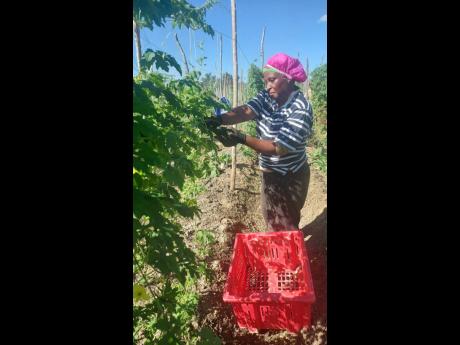Sweet relief for bitter melon
Local farm business to supply produce for UK niche market
Glenister Estate, which operates out of Bernard Lodge in St Catherine, will next week export its first batch of Chinese and Indian bitter melon to the United Kingdom (UK).
Bitter melon resembles the fruit which grows on the cerasee vine, but it is much larger in size. It is often used in a variety of stir-fry recipes and salads.
Hampered by Jamaica’s UK travel ban owing to the COVID-19 pandemic, CEO Steve Glenister told The Gleaner that he began introducing bitter melon to local customers.
“They are catching on to it and many people went on to research the health benefits. The Chinese and Indian communities gravitated towards it more because they know about it,” he said.
Approximately 300 kilograms will be exported this week, under a partnership with CLJ Logistics.
Glenister is eager to tap into the export market to help balance out the high import costs the country bears annually.
The value of Jamaica’s food imports is four times that of food exports, with the figure for 2020 at US$900,000, down from the 2019 figure of US$1 million.
Among the items that will be exported under the partnership are Indian eggplant, Thai eggplant, Indian okra, Mexican okra, green long beans, habanero pepper, crown pumpkin, Chinese pumpkin, papaya, plantain and banana.
In order to maximise on the partnership with the UK, Glenister explained that he will need 500 acres of land with proper irrigation and some 2,500 workers.
Produce can be exported up to three times per week.
“Glenister Estate and, by extension, Jamaica will benefit from this partnership through employment and foreign exchange. We spend US$1 billion on imports and we are not exporting. This is a vehicle through which we can increase exports and get the foreign exchange here,” Glenister said.
Director of CLJ Logistics, Julian Woodley, told The Gleaner that he mainly supplies goods to the Indian community in the UK.
Born in St Vincent, it has always been his desire to import goods from the Caribbean region but previous attempts in other countries had failed because of a lack of labour, among other reasons.
“We pay Mexico £2.5 million a year for produce for the Indian market and we also move over 20 pallets of okras a week from Honduras. I’m still taking goods from Honduras and Mexico, until Glenister Estate reaches the capacity to produce more,” Woodley explained.
Woodley, who has been in the food supply chain business for four decades, also imports pepper for Africans in England.
“He has a big opportunity to do a lot of things. This contract is based on the farmers’ ability to produce what we need. Glenister Estate has one thing no other Jamaican has: a customer who will take the produce,” Woodley said.




